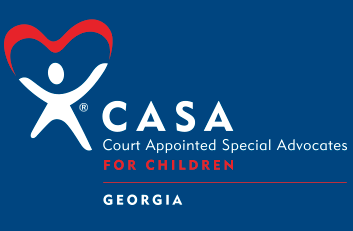
Get Involved
Help improve the lives of children in foster care in your community by getting involved with CASA.
Become a CASA Volunteer
CASA volunteers are everyday people from all walks of life who do exceptional work. They are trained to advocate for the well-being of Georgia’s children experiencing foster care and are appointed by the court to advocate for each child’s best interest. That’s their sole purpose.
What does a CASA volunteer do?
CASA volunteers:
- Establish a stable, one-on-one relationship with a child in foster care and get to know the child’s unique history
- Gather information from anyone who can shed light on the child’s situation – teachers, foster parents, family members, physicians, etc.
Help the child plan and develop age-appropriate goals
- Ensure the child has access to needed medical, education, career, and housing services
Attend court proceedings (usually every six months) and make an informed, independent recommendation to the judge to improve the child’s experience while in foster care and his/her overall well-being
- Bring a sense of urgency to the child’s needs and promote safety
- Advocate for timeliness and permanency for children involved in juvenile court proceedings
Remain involved until the case is permanently resolved to keep the focus on the child
Learn more about a CASA volunteer’s role and purpose
Check out this brief video about becoming a CASA volunteer
Check out some frequently asked questions
“Children are in need of dreams; children entering juvenile court have no dreams or hope for the future. CASA gives them that hope and helps them to understand that what has happened to them is not their fault; they are not defective or substandard. CASA volunteers are there to help a child rise above it all.”
Five Steps to Make a Difference
The actions of a single person — a CASA volunteer — can mean everything to a child in foster care. A child with a CASA is more likely to receive needed services and be placed in a safe, permanent home when reunification isn’t likely. CASA volunteers make a difference every day. You can, too. Become a volunteer.
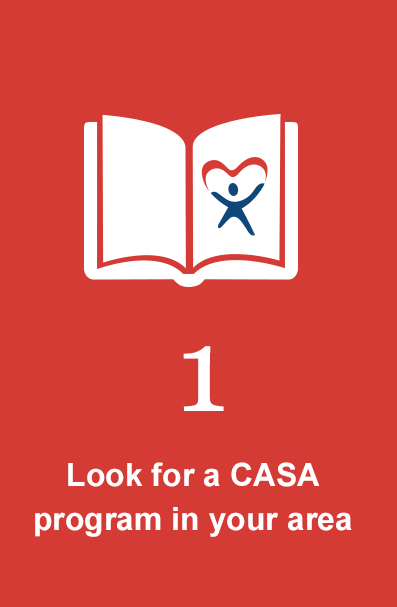
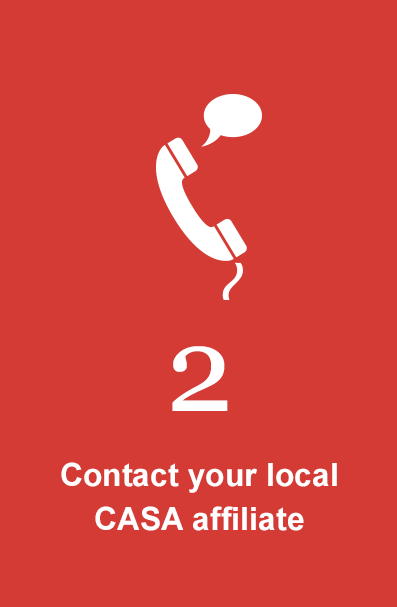
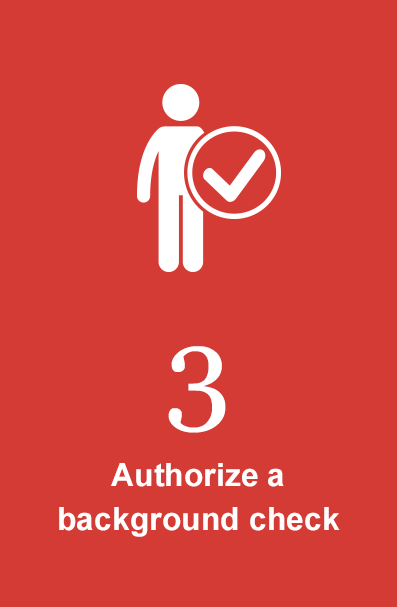
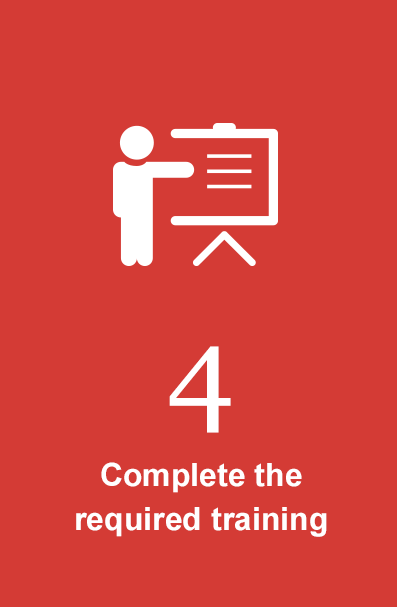

FAQ’s
No. CASA volunteers are everyday citizens from all walks of life who care about children and their welfare. Your common sense, life experience, and desire to help is all you need to begin. You will be receiving special training and supervision to ensure you have a complete understanding of your role before you are assigned a case.
Once children and youth are taken into DFCS (Department of Family and Children Services) custody, their cases are overseen by judges in the juvenile courts who appoint CASA volunteers to focus on the child and provide recommendations to improve a child’s experience while in foster care, as well as the child’s overall well-being.
Social workers are employed by the state and often assigned many cases at a time. The social worker is responsible for helping an entire family, which includes setting up individual services for family members. A CASA volunteer is the advocate for the child, is not paid, works with only a few cases at a time, and does not set up services. The CASA volunteer does not replace the social worker on a case; he or she is an independent officer of the court and works within the child welfare system to improve children’s experiences while in foster care.
CASA volunteers are only appointed to children who have come to the attention of the juvenile court system due to abuse or neglect. Like a mentoring program, the CASA volunteer does develop a relationship with the child through frequent contact; however, the primary role of the CASA volunteer is to gather information about the child, write reports to the court, and attend court hearings. The CASA program is not a mentoring program.
Program Training
A schedule of upcoming Volunteer Training sessions appears below for affiliate CASA programs that have requested to be listed. If you don’t see a particular program listed, please contact the program directly.
Orientation Contact:
Justine Ferreira
404-292-8291
Orientations (online)
Tuesday, December 2 at 6 p.m.
Wednesday, December 3 at 12 p.m.
Training Contact:
Email
404-378-0038
Online Trainings
Thursdays from 4 – 7 p.m.
October 9, 16, 23, November 6 and 13
Renita Clarke
901-496-6164
Website
Training
Starting in September – flex or online training
Dianna Dillard
404-859-7174
Website
Online Training
October 2025
Opens October 16
Classes: October 23 – November 20
Thursdays 6 – 9 p.m.
Advocates for Children
857 Joe Frank Harris Pkwy.
Cartersville, GA 30120
Alicia Newton
770-387-1143 ext. 238
Website
Classroom Training
Tuesdays beginning September 9
5:30 – 8:30 p.m.
CASA Office, Gilmer County Courthouse
1 Broad St.
Ellijay, GA 30540
Jason Turner
706-276-2272
Website
Information Sessions
2nd Wednesday of each month
10 a.m. – 12 noon
93 N. Pope St.
Athens, GA 30601
Flex Training (in-person + online)
Spring 2026:
Thursdays from February 12 – March 26 (except March 12)
5:30 – 9:15 p.m.
Summer 2026:
Fridays from May 8 – June 12
10 a.m. – 1:45 p.m.
Fall 2026:
Thursdays from September 10 – October 15
5:30 – 9:15 p.m.
Royston, GA 30662
Stacie or Kari
info@casaaac.org
706-491-2877
Website
Online Training
Begins Saturday, September 13
141 W. Soloman St.
Griffin, GA 30223
Madison Shetler
770-668-1477
Website
Classroom Training
Thursdays from January 15 – March 5
6 – 9 p.m.
Major Events
January 22, 2026
CASA Awareness Day in Georgia will take place across the state. Affiliate CASA programs will participate in the day by having Awareness Ambassadors share the impact and mission of the CASA program in their local communities. Awareness Ambassadors will also wear red shoes and a CASA sticker to help bring attention to the day. Those interested in becoming involved as an Awareness Ambassador can click here to take the pledge.
Visit https://www.gacasa.org/grow/ to learn more about the CASA volunteer opportunity.
February 12, 2026
Save the date for CASA Day at the Capitol that will take place in downtown Atlanta. More details will be announced in the future.
April 14, 2026
Save the date for the annual Georgia CASA Luncheon & Fashion Show, “CASA on the Catwalk,” that will take place at a private club in Buckhead. More details about the signature fundraiser will be announced in the future.
August 22, 2026
Save the date for the annual Georgia CASA Conference that will take place at the Renaissance Atlanta Waverly Hotel & Conference Center. More details will be announced in the future.
